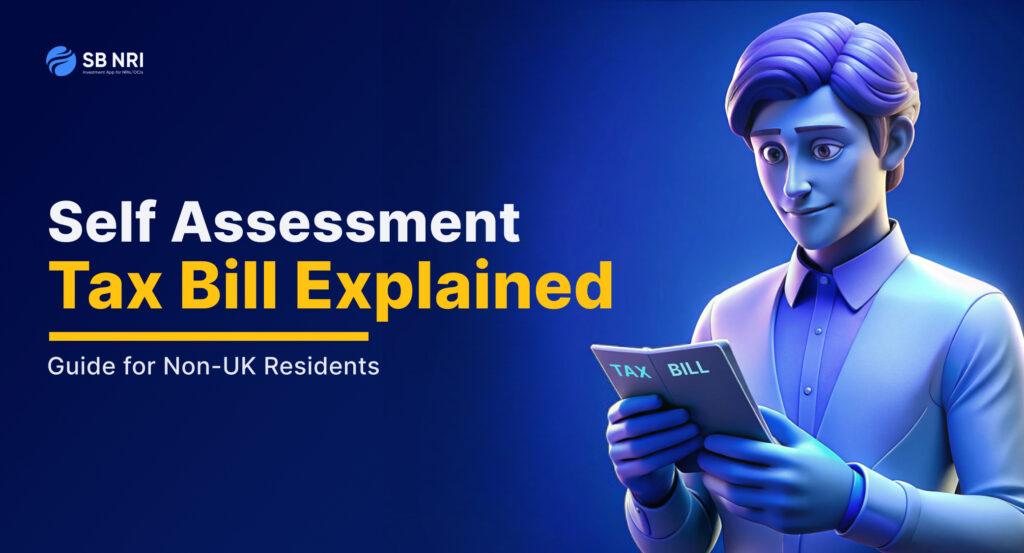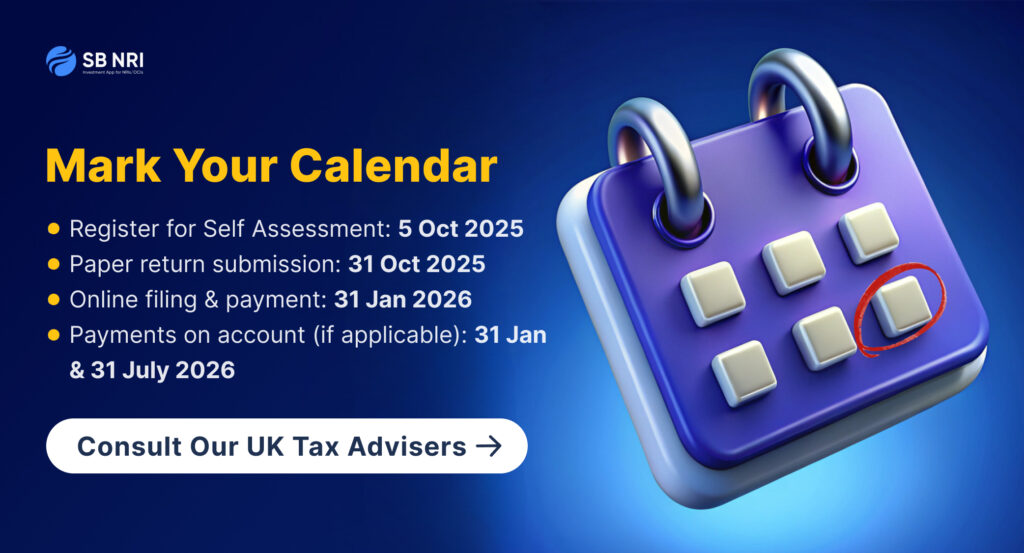
For NRIs with financial ties to the UK, such as rental income, pensions, self-employment, or capital gains, understanding your Self Assessment tax bill is essential. Unlike UK employees, whose taxes are deducted automatically through PAYE, non-residents must calculate and report UK-sourced income directly to HM Revenue & Customs (HMRC).
At first, the process may seem complicated. However, once you understand it, filing becomes manageable. Moreover, knowing the rules helps you avoid mistakes, penalties, and missed opportunities for relief. Filing a Self Assessment tax return UK is not just about compliance, it is also about staying in control of your financial responsibilities in the UK.
This guide will walk you through the essentials. Specifically, you will learn what a Self Assessment tax return UK is, why non-residents must file, which documents to gather, and the important Self Assessment tax return deadline to keep in mind.
What Is a Self Assessment Tax Return UK?
A Self Assessment tax return is HMRC’s method of collecting tax on income that has not already been taxed through the Pay As You Earn (PAYE) system. While employees in the UK typically have tax deducted automatically, non-residents and NRIs earning UK income must calculate and report it themselves.
This includes tax due on several income sources, such as:
- Rental income from UK property
- Self-employment income generated in the UK
- UK pension income
- Capital gains from selling UK property
Once your return is filed, whether on paper, through HMRC-approved software, or via a tax agent, HMRC will issue a tax calculation. This calculation outlines your liability and indicates if you need to make payments on account for the following year. In addition, it helps you plan ahead and avoid surprises in your Self Assessment tax return UK.
Why Do NRIs Need to File a Self Assessment Tax Return?
Even if you live outside the UK, NRIs with UK income must declare it. Filing a Self Assessment tax return allows you to:
- Report your UK income accurately (do Self Assessment tax return)
- Pay any tax due within Self Assessment tax return UK deadline
- Claim relief under Double Taxation Agreements (DTAs) so that you do not pay tax twice on the same income
- Request refunds if too much tax was deducted at source
By filing correctly, NRIs remain compliant, avoid penalties, and ensure fair taxation of their UK income.
Documents Required for Filing a Self Assessment Tax Return
Having the right documentation makes filing smoother. Essential documents include:
- Unique Taxpayer Reference (UTR) from HMRC
- SA100 main return form
- SA109 (Non-Resident Supplement) if applicable
- Records of UK income, such as property rental statements, pension slips, or business accounts
- Records of allowable expenses that can reduce taxable income (e.g., property maintenance costs)
- Tax Residency Certificate (TRC) from your country of residence if you want to claim Double Taxation Relief
- Bank details if you expect a tax refund
Tip: By organizing these documents in advance, you reduce the chance of errors and avoid delays.
How to File a Self Assessment Tax Return from Abroad
Follow these steps if you are filing from outside the UK:
Step 1. Gather your documents
- SA100 main return form
- SA109 (if you need to declare residence or remittance details)
- Income records, expense receipts, UTR, and other supporting documents
Step 2. Check if SA109 is required
- If yes: cannot use HMRC’s standard online portal for the entire return. You must submit the main return online and file SA109 separately by post or through HMRC-approved commercial software.
- If no: may be able to file through HMRC’s personal online service
Step 3. Choose your filing method
- Paper filing – Post SA100 (and SA109, if needed) directly to HMRC
- HMRC-approved commercial software – Many providers support SA109 and are suitable for non-resident returns
- Tax agent or adviser – A professional can prepare and submit the return on your behalf
Need help with your UK Self Assessment tax return? Connect with our trusted advisers in the UK for smooth and error-free filing.
Common Mistakes to Avoid When Filing a Self Assessment Tax Return
Many NRIs face penalties due to simple oversights, not evasion. Common mistakes include:
- Missing deadlines:
- Register by 5 October 2025 if it’s your first Self Assessment submission.
- Paper returns due 31 October 2025.
- Online return and tax payment due 31 January 2026.
- Payments on account (if applicable) are due 31 January and 31 July 2026.
- Incomplete declarations: Forgetting income from pensions, property, or capital gains can result in underreporting and fines.
- Wrong filing method: If you need to file SA109, you cannot use HMRC’s basic online portal for the entire return. You must submit the main return online and file SA109 separately by post or through HMRC-approved commercial software.
- Claiming ineligible reliefs: Non-residents are generally not entitled to the UK personal allowance unless a Double Taxation Agreement (DTA) between the UK and your country of residence provides for this. If eligible, indicate this on the SA109 form.
- Poor record-keeping: Missing receipts or income records can make it harder to justify expenses or correct errors.
Avoiding these mistakes ensures timely filing, reduces liabilities, and helps you stay penalty-free.

Important Updates Post-6 April 2025
- Residence-Based Regime Replaces Remittance Basis: From April 2025, tax is based on UK residence rules, abolishing the old domicile-based remittance system.
- Four-Year Foreign Income and Gains (FIG) Regime: If you become a UK tax resident after being non-resident for the previous 10 tax years, you may qualify for the Four-Year FIG Regime. This allows full relief from UK tax on most foreign income and gains for the first four years of residency. To benefit, claim this relief through your Self Assessment return.
- Overseas Workday Relief (OWR): OWR ) continues under the new system, but it caps at the lower of 30% of qualifying employment income or £300,000 per tax year. Make sure you meet the qualifying criteria and claim this relief correctly in your Self Assessment tax return.
- Transitional Provisions: Those who previously used the remittance basis cannot claim FIG for income or gains accrued before 6 April 2025. A Temporary Repatriation Facility (TRF) allows historic offshore funds to be brought into the UK at a reduced tax rate.
Conclusion
For NRIs, filing a Self Assessment tax bill is not just about compliance. It is also about taking control of your financial future. With proper planning, you can avoid penalties, claim Double Taxation relief, and make confident decisions about your UK income.
By staying organized, keeping track of deadlines, and seeking expert guidance when needed, you can make the process smooth and stress-free.
Click the link below to file your taxes with expert CAs in India and Tax Advisers in the UK for fast, accurate and stress free filing.
About SB NRI
SB NRI is a dedicated platform for Non-Resident Indians, providing seamless solutions for managing investments, tax filings, and financial planning in India. With expert guidance, easy-to-access resources, and a focus on compliance, SB NRI helps NRIs navigate complex Indian and UK financial regulations confidently.
So whether you’re dealing with property income, capital gains, or claiming treaty relief, SB NRI ensures you stay organized, informed, and ahead of deadlines.
Frequently Asked Questions
Q1. Do NRIs need to file a UK Self Assessment tax return?
Yes. NRIs must file a self assessment tax return in the UK if they earn income from UK sources such as rental property, pensions, self-employment, or capital gains from UK land and property.
Q2. Do NRIs pay tax on foreign income in the UK?
No. HMRC taxes non-residents only on UK income. You pay tax on foreign income only if you qualify as a UK resident under the Statutory Residence Test.
Q3. Can NRIs claim the UK personal allowance
Usually not. Some NRIs can claim it if their country has a Double Taxation Agreement with the UK. If eligible, this must be declared in the self assessment tax return.
Q4. What are the deadlines for filing a Self Assessment tax return?
The self assessment tax return deadline is 31 October for paper returns and 31 January for online returns through self assessment tax return gov uk. Tax payments are also due by 31 January.
Q5. How can NRIs file a Self Assessment tax return from abroad?
If you need to file SA109, you cannot use HMRC’s basic online portal. You must submit a paper return, use HMRC-approved software, or appoint a UK tax adviser to meet the self assessment tax return UK deadline.
Q6. What is a Self Assessment tax return UK?
HMRC collects tax on income not taxed at source, including property income, pensions, self-employment, and capital gains. Your self assessment tax bill shows the balance due, and some examples use “self assessment tax 300” to illustrate calculations.
Q7. Is there a specific due date to pay Self Assessment Tax?
There is no fixed date. You must pay before filing your Income Tax Return. To avoid penalties, clear the balance before the self assessment tax return deadline.
Q8. What is the difference between Self Assessment Tax and Advance Tax?
Advance Tax is paid in installments during the financial year. Self Assessment Tax is the final balance due before filing your self assessment tax return.
Q9. Can Self Assessment Tax be paid in installments?
Yes, you can pay in multiple installments. Make sure you clear the full amount before the self assessment tax return UK deadline.
Q10. How long is a Challan (CRN) valid?
A CRN is valid for 15 days, and up to 90 days if paying by check. Make sure you process the payment before filing your Self Assessment tax return.
Q11. Are there restrictions on when I can pay online?
No. You can pay taxes anytime using Self Assessment tax return GOV UK, net banking, a debit card, or UPI.
Q12. Can Self Assessment Tax be paid offline?
Yes. You can pay at authorized banks using Challan 280 through cash, cheque, or demand draft. Always generate the CRN online first.
Q13. What if my tax payment does not show in my ITR?
It usually updates within a few days. If not, manually enter the Challan number, BSR code, and payment date in your self assessment tax return UK.
Q14. By when should Self Assessment Tax be paid to avoid Section 234A interest?
It should be paid by the ITR due date. For individuals in India this is 31 July and for the UK it is 31 January. Paying on time helps avoid interest.
Q15. How to file a Self Assessment tax return from abroad?
Gather SA100, SA109, UTR, and income records. File by paper, use HMRC-approved software, or appoint a tax agent through self assessment tax return gov uk.



